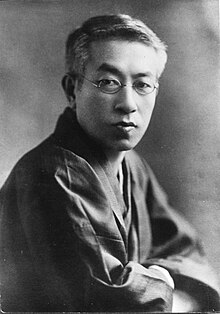Shimazaki Tōson
Shimazaki Tōson ( Japanese 島 崎 藤 村 ; born March 25, 1872 in Magome (today: Nakatsugawa ) as Shimazaki Haruki ( 島 崎 春樹 ); † August 22, 1943 in Tokyo ) was a Japanese writer of the Meiji and early Shōwa period .
Life
Shimazaki was born in 1872 to an influential family in the rural town of Magome in what is now Gifu Prefecture.
He received his education at the Mitaei School ( 三 田英 学校 ; Kinjō Middle School 錦城 中学 ) and the Kyōritsu School ( 共 立 学校 ; today's Kaisei High School 開 成 高校 ). He studied at the Protestant Meiji Gakuin (today Meiji Gakuin University ), then a private school in Tōkyō , and converted there to the Christian faith. There he made friends with the essayist and translator Baba Kochō ( 馬 場 孤 蝶 ) and with Togawa Shūkotsu . It was through these friendships that he became interested in literature. Together they were among the graduates of the first class in 1891 .
After graduating, he wrote translations for the women's education thematic magazine Jogaku Zasshi and began teaching English at Meiji Jogakkō (Meiji Girls' School) in 1892 . After an unfortunate love affair with one of his students in 1893, he wandered around the Kansai area for six months and finally, with one interruption, retired to the Kigen-in of the Engaku-ji temple in Kita- Kamakura until October .
Shimazaki was one of the co-founders of the literary society Bungakukai in 1893 , together with Kitamura Tōkoku .
He became known through his first publication, the collection of poems Wakanashu ( 若 菜 集 , dt. "Collection of young herbs"), 1897. From 1901 he worked at the Komoro Private School ( 小 諸 義 塾 ) and wrote several prose works by 1906; Kumo ( 雲 , German "clouds"), Chikumagawa no Sketch ( 千 曲 川 の ス ケ ッ チ , Chikumagawa no Suketchi , German "Sketches of the Chikuma River") and Kyūshujin ( 旧 主人 , German "former master").
Although he enjoyed success as a poet, he eventually turned to prose literature. His first prose works are Hakai and Ie . After the death of his wife, he moved in with his niece Komako. With this he entered into an incestuous relationship. When the scandal became known, Shimazaki had to leave Japan. From 1913 he lived in Paris and then Limoges, where he also experienced the First World War until 1916. After returning to Japan, he began to write again and processed his relationship with Komako in Shinsei , 1919.
In 1928 he married again. There were z. B. Yoake mae and Toho no mon .
Shimazaki was awarded the Asahi Prize in 1935 and was the first chairman of the newly formed Japanese PEN Club ; In 1940 he became a member of the Imperial Academy.
He died of a brain haemorrhage in 1943. His grave is in the Magome cemetery .
About the work
A work of the flowering of romanticism in the Meiji period ( 明治 浪漫主義 ) is due to Shimazaki's poetry collection Wakanashu , 1897. The works Haru , Ie , Shinsei and Arashi are typical of naturalistic literature in Japan. Many of his works deal with different aspects of life in his home region.
In 1906 he published Outcast ( 破戒 , Hakai ). This deals with the topic of the Burakumin , socially disadvantaged groups in Japan, formerly known as Eta, using the example of an outcast school teacher. This book became very influential in Japan. Since then his interest has turned to discussions of philosophy and lifestyle.
Shimazaki often described his nature as " melancholy inherited from parents ". His father and oldest sister died of mental illness. He took his father Masaki as a model for his book Yoakemae ( 夜 明 け 前 , dt. "Before dawn").
Works
Poems
- Wakanashu ( 若 菜 集 , something like "Collection of Young Herbs"), 1897
- Rakubaishu ( 落梅 集 , something like "Falling Plum Blossoms"), 1901
Novels
- 1906 Hakai ( 破戒 )
- German translation by Jürgen Berndt, Insel Verlag, Frankfurt am Main, 1989
- 1908 Haru ( 春 , roughly "spring")
- 1910 Ie ( 家 , English "Family")
- 1919 Shinsei ( 新生 , "A New Life")
- 1935 Yoake mae ( 夜 明 け 前 , Eng. "Before dawn")
- 1943 Toho no Mon ( 東方 の 門 , "The East Gate")
Filmography
- 1948 - Hakai ( 破戒 ), directed by Ichikawa Kon
- 1953 - Yoake mae ( 夜 明 け 前 ), directed by Yoshimura Kozaburo
- 1956 - Arashi ( 嵐 ), directed by Inagaki Hiroshi
- 1962 - Hakai ( 破戒 ), directed by Kinoshita Keisuke
Individual evidence
- ↑ Die kleine Enzyklopädie , Encyclios-Verlag, Zurich, 1950, Volume 2, p. 607.
| personal data | |
|---|---|
| SURNAME | Shimazaki, Tōson |
| ALTERNATIVE NAMES | 島 崎 藤 村 (Japanese); 島 崎 春樹 (Japanese, real name); Shimazaki Haruki (real name) |
| BRIEF DESCRIPTION | Japanese writer of the Meiji and early Showa periods |
| DATE OF BIRTH | March 25, 1872 |
| PLACE OF BIRTH | Magome |
| DATE OF DEATH | August 22, 1943 |
| Place of death | Tokyo |
